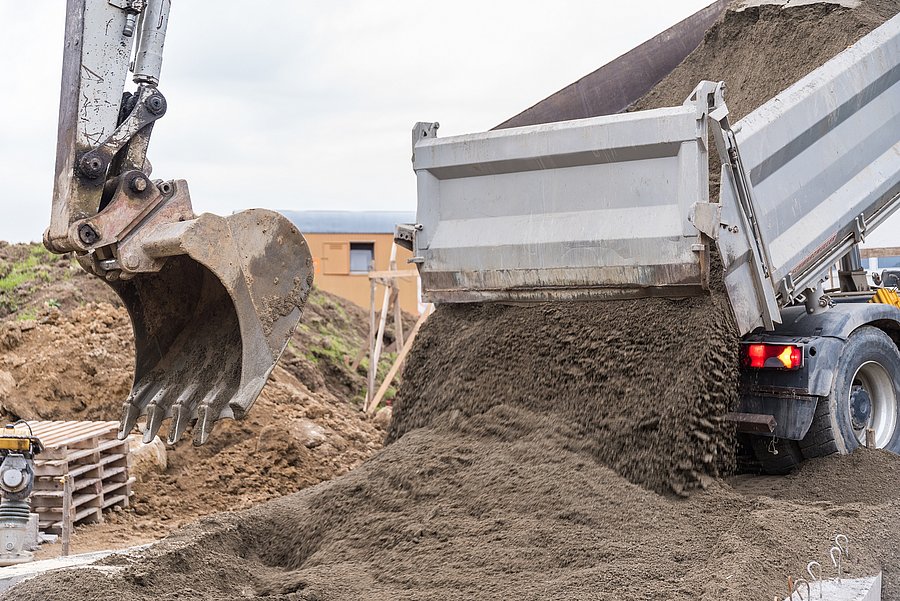STArLOG research project launched
Black box construction site logistics: data standards to optimise collaboration and protect the environment in future

Starting signal for STArLOG: The project team led by traffic engineer Sabrina Puslat (6th from left) and head of department Prof Dr Bert Leerkamp (5th from left, both from the University of Wuppertal) received the grant notification in person from NRW Environment and Transport Minister Oliver Krischer // Photo MUNV NRW
"It is part of the daily business on construction sites that more than a third of the delivery announced for a day does not arrive. Conversely, it is not uncommon for twice as many vehicles to turn up as expected for the day. Such unannounced deliveries are generally not subsequently recorded. This makes it impossible to plan and control construction site logistics in advance," says transport engineer Sabrina Puslat from the Department of Freight Transport Planning and Transport Logistics at the University of Wuppertal. The lack of information on the type of material delivered and the quantities involved also poses a challenge when optimising deliveries and departures. Although companies in the field of construction site logistics already have tools at their disposal to record data announcing a delivery, the software, the information requested and its handling, for example, differ from company to company. The researchers recognise that, in addition to a standardised structure for correct data collection, the industry also lacks a consensus on which data is important in order to manage the supply and disposal of construction sites in the best possible way. Cities, on the other hand, lack reliable information with which they can estimate the traffic volume of large construction sites before construction begins and prepare urban traffic management accordingly.
Maintaining a balance
Over the next three years, the project partners, led by the university of Wuppertal, will be investigating whether there is a better way and whether this could mean worthwhile time and cost savings for the companies involved in the "STArLOG - Data Standards for Construction Site Logistics" project. In order to pave the way for this, the scientists, in collaboration with their partners from the construction industry, want to identify which data structures already exist - as some have ideally already proven themselves - as well as determine what other data requirements there are for construction site logistics, but also for research, and in what form these can best be collected. "The challenge is to maintain a balance. A supplier that has to announce a freight for the construction site is not helped if employees have to deal with an overwhelming number of questions and input fields in a portal beforehand," says Puslat.

No construction materials without vehicles. With the right data, traffic around construction sites should be easier to plan in future. This will help save money and protect the environment. // Photo Colourbox
Creating visibility for effects
The data to be recorded includes the type of vehicle used for the delivery, the quantity of building material and the distance travelled. Puslat: "This is data that makes it possible to analyse transport journeys, for example the extent to which vehicles are used to capacity, whether journeys can be combined and thecarbon footprint of a building's construction site traffic." This knowledge is just as crucial for the planning of sustainable construction site logistics as it is for potential time and cost savings on the part of clients and construction companies. "An overarching goal of the project is to create visibility for the effects of a standardised data basis in the industry," emphasises Puslat. Subsequent steps in the project will also take practical testing into account: together with the project partners, the developed data standards will be tested in the ongoing construction process. If successful, they will then be converted into a DIN standard in collaboration with the German Institute for Standardisation (DIN).
The "Data standards for construction site logistics (STArLOG)" project is funded by the Ministry for the Environment, Nature Conservation and Transport of the State of North Rhine-Westphalia from the Regional Development Fund (ERDF) and by the EU via the Just Transition Fund (JTF programme 2021-2027). The project partners were presented with their grant notification in person by Minister Oliver Krischer in Düsseldorf last Wednesday. In addition to the University of Wuppertal, the consortium includes Lean Construction Logistik GmbH, LEAN Projektmanagement GmbH, Bausicht GmbH and WSS-IT GmbH. SiteLog GmbH, Zeppelin Rental GmbH and the cities of Dortmund and Wuppertal are also involved in the project as associated partners. The project is being funded with a total of around one million euros. The University of Wuppertal has around 490,000 euros of this at its disposal.

Construction site logistics and inner-city freight transport
The Department of Freight Transport Planning and Transport Logistics, headed by Prof. Dr.-Ing. Bert Leerkamp, specialises in research in the field of regional and urban freight transport. Construction site traffic accounts for around 20 to 30 per cent - and therefore a not insignificant proportion - of inner-city freight traffic. It is therefore worth taking a closer look at them in order to minimise unfavourable effects such as emissions, congestion and noise pollution. However, as the research project "Reduction of inner-city heavy goods traffic by optimising construction logistics - Insta Baulog" funded by the state of North Rhine-Westphalia has shown, there is a lack of suitable data to investigate construction site traffic in detail and to make it more efficient and environmentally friendly in the future. The STArLOG follow-up project aims to change this.
